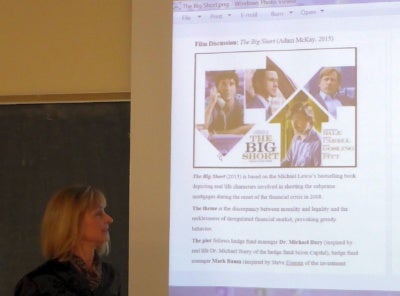Should the purpose of undergraduate education be to prepare students for the workforce or to be citizens of the world? As we’ve written before, this is a false dichotomy. There are few better arguments for leaving that thinking behind than Stony Brook University Professor Jadranka Skorin-Kapov’s course Business Ethics: Critical Thinking through Film, a 2018 Ideas Worth Teaching Award winner. In this course, Dr. Skorin-Kapov uses films to help students grapple with business decisions and their consequences. We spoke to her about the ambitious goals she set for her students.

You believe that films can serve as a form of career preparation, much like pilots use flight simulators and architects use models. Why is that?
Preparation for any job can benefit from a simulated environment. Business students are preparing for challenging jobs, e.g., a managerial career mired in various ethical issues as well as the personal challenge of juggling professional and private lives. They can benefit from engaging in film narratives and identifying with its characters.
According to Aristotle, a good tragic spectacle (as a form of art) induces emotions of pity and fear that lead to catharsis or purification of such emotions and contributing to one’s virtuous development. Adapted to our contemporary situation, we suggest that identification with a film character can contribute to one’s virtuous development. I address various ethical issues arising in professional and business settings and the role of individuals making decisions and coping with moral dilemmas in my recently published book Professional and Business Ethics through Film: The Allure of Cinematic Presentation and Critical Thinking.
How did you choose the films used in your course?
The films discussed in the course were selected based on their potential to clarify a certain argument, be it ethical, or artistic, or businesslike. The films selected were quite diverse, including American and foreign films, some very recent films and some not that recent, but still very relevant. Specifically, the films assigned for class notes and discussed in more details were: Margin Call (J.C. Chandor, 2011), Insomnia (Eric Skjoldberg, 1997) and its remake Insomnia (Christopher Nolan, 2002), Experimenter (Michael Almereyda, 2015), Arbitrage (Nicholas Jarecki, 2012), The Day After Tomorrow (Roland Emmerich, 2004), A Most Violent Year (J.C. Chandor, 2014), Two Days, One Night (J. Dardenne and L. Dardenne, 2014), The Hunt (Thomas Vinterberg, 2012), Babel (Alejandro Iñárritu, 2006).
Using a diverse set of films we were able to discuss ethical issues facing us today, presented in different styles. With respect to ethics, we were seeking answers to various questions, including the following: Does the end justify the means? What is cultural relativism? What are the sources of discrimination? What is responsibility? How important are environmental issues? The films induced discussions about professional behavior and business: What is workforce ethics? What is greediness? What is bribery? What is whistleblowing? What is fraud?
Watching a film can benefit a business student by nurturing creativity and novel ways of thinking applicable in a business setting. One can look at the film as a product made to be sold to spectators and look for the characteristics that make it successful. As a customer evaluating a product, a student needs to critically evaluate the film in terms of its artistic creativity versus its business goal, including a marketing potential for propagating a certain view or ideological position.
What advice do you have for professors who have an interest in blending business and the liberal arts?
I believe that the kind of business curriculum that takes the humanities seriously will better prepare students for future. They equip students to live a meaningful, fulfilling professional life, and to serve the public through their business endeavors. The goal is to cultivate ethical education — including the development of moral virtues, skills, and social and environmental responsibility — in a new generation of business students. Business curricula need to take into account the changed reality combining the following facts: our depleted natural resources, the increased gap in wealth distribution, the unprecedented development of technology changing the job structure, as well as human interaction.
It is unquestionable that humanity faces numerous societal challenges and environmental problems. While ethical conduct was always valued generally, the importance of ethical considerations in professional and business settings is especially pronounced now due to the far-reaching consequences of globalization and connectivity based on technological advances. The fast rate of technological change has a profound impact on the job structure, creating new ways of conducting business and new ways of social interactions.
In my book The Intertwining of Aesthetics and Ethics, I wrote that “film can serve as a ‘laboratory’ of human behavior, allowing new insights into the interactions of aesthetics and ethics. The roles of aesthetics and ethics, i.e. the roles of artistic and moral judgments, are very relevant to contemporary society and business practices, especially in light of the technological advances that have resulted in the explosion of visual culture and in the mixture of awe and apprehension as we consider the future of humanity.”

Dr. Skorin-Kapov teaches a business ethics course at Stony Brook University’s College of Business.
How have students reacted to the course?
Some positive comments to the question “What, if anything, did you find most valuable about this course?” were as follows:
- How movies can influence the way college students and other individuals can translate business ethics and apply it to the real world.
- It causes you to reflect more during movies and gives you a new perspective on them/while watching.
- This class forced you to see your personal flaws when it comes to ethics, and realize that life is certainly never ‘black and white.’
What movie have you seen recently that you loved and why?
Recently I saw The Shape of Water (Guillermo del Toro, 2017) and liked it as a poetic and surprising film, with visually stunning scenes, provoking imagination and meditation on the nature of love and the need for connectivity. I also liked Happy End (Michael Haneke, 2017) for its unflinching questioning of some of our contemporary issues and fears, as I am a fan of Haneke.
I liked The Big Short (Adam McKay, 2015) depicting real-life characters involved in shorting the subprime mortgages during the onset of the financial crisis in 2008. The theme is the discrepancy between morality and legality. The recklessness of the deregulated financial market provoked greedy behavior. Yet the film presents the characters as eccentric, concerned but pragmatic, and to a certain extent likable, certainly not the villains who are unreasonably greedy. It seems that they did not have a choice given the state of the financial banking sector. Comic elements are underlined with celebrity cameos explaining complex financial derivatives. The characters are introduced with their names, positions, and some descriptions as if telling a business case study to be published somewhere. This adds to the documentary feel of this feature film, which is appropriate since the narrative is based on real events and real people, making it even more troublesome.
![]()
Interested in more innovative insights for business education? Browse our complete collection of interviews with outstanding educators, and subscribe to our weekly Ideas Worth Teaching digest!

